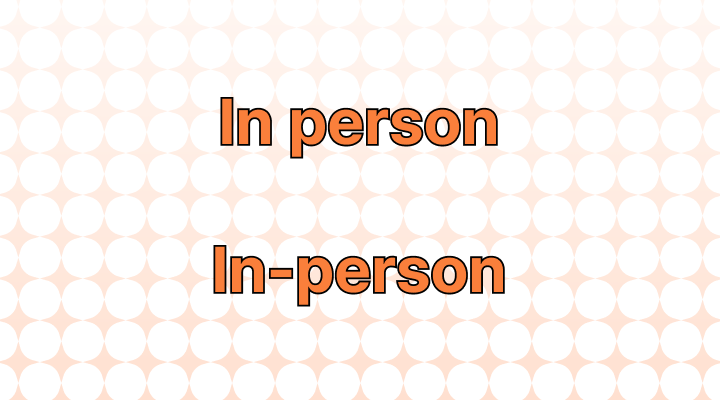In person (not hyphenated) is an adverbial phrase that describes the act of being physically present at a specific location or event. In-person (hyphenated) is an adjective that describes something occurring or involving face-to-face interaction or physical presence.

What does in person mean?
In person is an adverbial phrase that refers to physically being present at a particular location or event. It emphasizes the act of being there physically rather than remotely or virtually.
Example scenario
- I want to meet you in person.
This person is expressing their desire to meet face-to-face, not through a phone call or video conference. "In person" underscores the importance of direct, physical presence in a given context.
What does in-person mean?
In-person is an adjective used to describe something that occurs or is conducted face-to-face or physically, typically in the context of events, meetings, or interactions. It is hyphenated to indicate that it modifies a noun.
Example scenario
- We had an in-person meeting.
This signifies that the meeting took place with participants physically present, as opposed to being held virtually or remotely. In this case, "in-person" clarifies the mode of interaction or participation.
Understanding this distinction is crucial for effective communication, as it ensures that you convey your message accurately and precisely, whether you're discussing personal encounters or describing the format of an event or activity.
Common idioms/phrases
- Meet in person: Refers to meeting someone face-to-face rather than virtually or through other means.
- Example: "Let's schedule a meeting to discuss the project in person."
- In-person experience: Describes an event or activity that occurs with physical presence or participation.
- Example: "Attending a concert in person gives you a more immersive and memorable experience."
- In-person interview: Indicates a job interview where the candidate meets with the employer or hiring manager in a physical location.
- Example: "The company prefers to conduct initial interviews in person to assess candidates more thoroughly."
- In-person learning: Refers to traditional classroom-based education where students and instructors are physically present in the same location.
- Example: "Due to the pandemic, many schools had to switch from in-person learning to remote classes."
- In-person sales pitch: Describes a sales presentation or pitch delivered directly to a potential customer or client, often face-to-face.
- Example: "The sales team prefers to make in-person sales pitches to establish a personal connection with clients."
- In-person event: Refers to gatherings, conferences, or social occasions that take place with attendees physically present.
- Example: "The conference organizers decided to host an in-person event this year, with safety precautions in place."
While "in person" and "in-person" are not idiomatic themselves, they are commonly used to describe various situations and events where physical presence is a key aspect.
How to differentiate the two words
The main difference is that in person is an adverb, while in-person is an adjective. In-person will always describe a noun, while in person would describe how something was or will be done.
Practice questions
- She preferred to deliver her presentation in person/in-person rather than via video conference.
- The in person/in-person interview allowed the employer to assess the candidate's communication skills.
- Attending the wedding in person/in-person was important to the bride and groom.
- We had an in person/in-person meeting to discuss the project's progress.
- Despite the pandemic, some businesses continued to offer in person/in-person services.
- The conference was initially planned as an in person/in-person event but was later moved online.
- It's challenging to convey emotions accurately through text messages; in person/in-person conversations are often more effective.
- She was excited to finally meet her online pen pal in person/in-person.
- The doctor recommended an in person/in-person consultation to better diagnose the patient's condition.
- In person/in-person learning is beneficial for students' social and emotional development.
If you still are unsure about which to use, try out Engram where you can submit your English sentences to get immediate feedback and suggestions based on how native English speakers write.

Answer
- in person
- in-person
- in person
- in-person
- in-person
- in-person
- in-person
- in person
- in-person
- In-person
Reference














